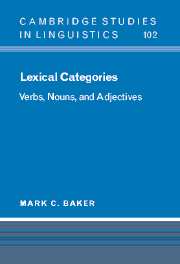Book contents
- Frontmatter
- Contents
- Acknowledgements
- List of abbreviations
- 1 The problem of the lexical categories
- 2 Verbs as licensers of subjects
- 3 Nouns as bearers of a referential index
- 4 Adjectives as neither nouns nor verbs
- 5 Lexical categories and the nature of the grammar
- Appendix Adpositions as functional categories
- References
- Index
3 - Nouns as bearers of a referential index
Published online by Cambridge University Press: 06 January 2010
- Frontmatter
- Contents
- Acknowledgements
- List of abbreviations
- 1 The problem of the lexical categories
- 2 Verbs as licensers of subjects
- 3 Nouns as bearers of a referential index
- 4 Adjectives as neither nouns nor verbs
- 5 Lexical categories and the nature of the grammar
- Appendix Adpositions as functional categories
- References
- Index
Summary
What is special about nouns?
I turn now to consideration of what sets nouns apart from verbs and adjectives. Using phrase structure and theta-role assignment to distinguish verbs from nouns and adjectives builds on relatively familiar techniques; syntacticians are accustomed to specifying the theta-grid of a lexical item and to having this grid determine the syntactic structure that the word appears in. The basic principles that regulate theta-role assignment are also very familiar. Working from this model, some generative linguists have attempted to define all of the syntactic categories in terms of their characteristic argument structures and/or the grammatical functions that they take (Jackendoff 1977; Bresnan 1982; Hale and Keyser 1993). But there is little evidence that this is the right approach. Simple nouns do not differ from adjectives in these respects: the phrase structure and theta-role assignment dynamics of John is a fool are essentially identical to those of John is foolish, for example, even though fool is a noun and foolish an adjective. As a result, we saw in the last chapter that both nouns and adjectives need a copular particle in order to be used predicatively, both tend not to take tense morphology, both need a different causativizer than verbs do, and both act like un ergative predicates. Nouns apparently differ from adjectives and verbs not in their argument structures, but along some other dimension altogether. Finding that dimension requires some theoretical inventiveness.
- Type
- Chapter
- Information
- Lexical CategoriesVerbs, Nouns and Adjectives, pp. 95 - 189Publisher: Cambridge University PressPrint publication year: 2003

